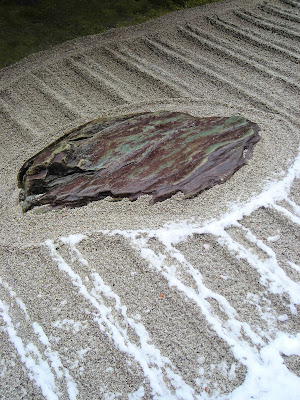Twilight of the Bard
16th November 2010
It's not often you can read vampire novels and call it research.
...
Halloween may be over but the undead are alive and well in cinemas all over Japan.
Eclipse, the third in the Twilight vampire saga, opened here two Saturdays ago – good news for me because I’d caught the first two instalments on a recent flight from Singapore but only a fraction of the third. The plane had to land or something.
I was, like, I totally have to find out what happens next!
A recap for those unfamiliar with the Twilight world: On June 2, 2003, US housewife Stephenie Meyer had a dream of a vampire and a human in a meadow. The vampire, though drawn to the girl, was explaining how hard it was for him not to kill her.
The desire to learn if he would pushed Meyer to turn her dream into a book. The stakes are raised: Edward, a reluctant vampire, subsists on animal blood and to attack Bella would make him the monster he tries not to be. The venom of his bite will also turn her into a vampire – a damned creature unable to sleep, dream or change. To risk her soul just so he won’t lose her, he says, would be the most selfish thing he could ever do.
The romance – complicated with the introduction of werewolves – runs over four novels that have become a juggernaut capable of taking on the Harry Potter phenomenon.
But not everyone’s pleased; critics have accused the series of everything from bad writing to driving a stake through the heart of feminism. (Though presumably the latter criticism doesn’t cover the werewolves wandering around with their shirts off when in human form.)
Maybe a change of packaging will make the tale more palatable to its detractors. So here’s Twilight in the words – more or less – of another writer who also became rich and famous for stories about love and conflict.
(Prologue)
Chorus:
Two races, both alike in dignity,
In fair Washington, where we lay our scene;
From species grudge break to new mutiny,
Where human blood sets undead eyes a-gleam.
From the fangs and loins of these two foes
A pair of star-cross’d lovers take their life;
Whose meadow adventures and sunlight woes
Do with their love bury their species’ strife.
The fearful passage of their death-mark’d love,
And the continuance of the critics’ rage,
Which even shirtless werewolves couldn’t remove,
Is now the traffic of the franchise stage;
The which if you with patient ears attend,
What here shall miss, the special edition DVD shall strive to mend.
(Bella realises Edward is a vampire. She wrestles with this.)
Bella:
O Edward, Edward! wherefore art thou Edward?
Deny thy blood thirst and refuse thy fangs;
Or, if thou wilt not, be but sworn my love,
And I’ll no longer be a human.
(She doesn’t wrestle for long. Edward, on the other hand, does. Should he sink his teeth into her so she joins him in vampire eternity? Or should he keep her from becoming a monster? He himself joined the undead only because an older vampire, Carlisle, saw no other way to save the human Edward from an illness.)
Edward:
To bite, or not to bite: that is the question:
Whether ’tis nobler in the mind to suffer
The slings and arrows of outrageous desire,
Or to open arms to a sea of longing,
And by surrendering, take life? To die: to sleep;
Then more; for by a sleep to say I end
The heart-beat and the thousand natural shifts
That flesh is heir to, ’tis a consummation
Devoutly to be fear’d. To die, to sleep;
To wake: no more to dream: ay, there’s the rub;
For after that sleep that no dreams will come
If I should tear off her mortal coil,
Must give me pause: there’s the reason
That makes a misery of immortal life;
For she would bear the whips and scorns of time,
The oppression of age, the small town’s boundaries,
The pangs of frustration, a balking lover’s delay,
If she but knew the barren quietus made
With venomous teeth. She would her burdens bear,
To groan and sweat under a weary life,
If dread of this world were set by rotted death,
The discovered country from whose bourn
I have returned. This stiffens my will
And makes me rather bear those ills I have
Than push her to others that she knows not of.
Thus conscience may make a Carlisle of me
After all; and thus inflamed temptation
May take on the pale cast of thought,
And enterprises of rapacity and damnation
Could thus see their currents turn awry,
And regain the grace, nearly lost, of principle.
Which way will Edward decide? The answer’s in Breaking Dawn, the final novel in the series. It’s the one with the cover picture of a chessboard, a blood-red pawn and, in front of it, a pale queen.
...
(Originals here and here. I hope that sound isn't the sound of one corpse turning.)
Wednesday, November 17, 2010
Subscribe to:
Post Comments (Atom)

No comments:
Post a Comment